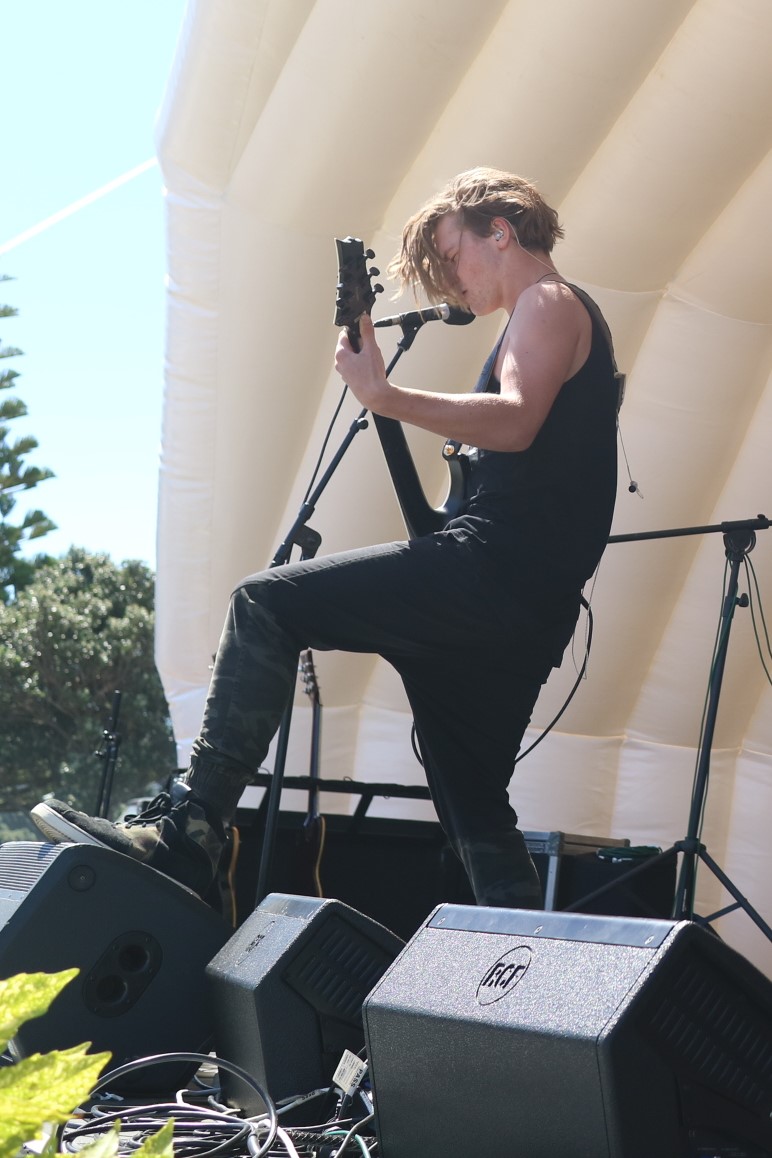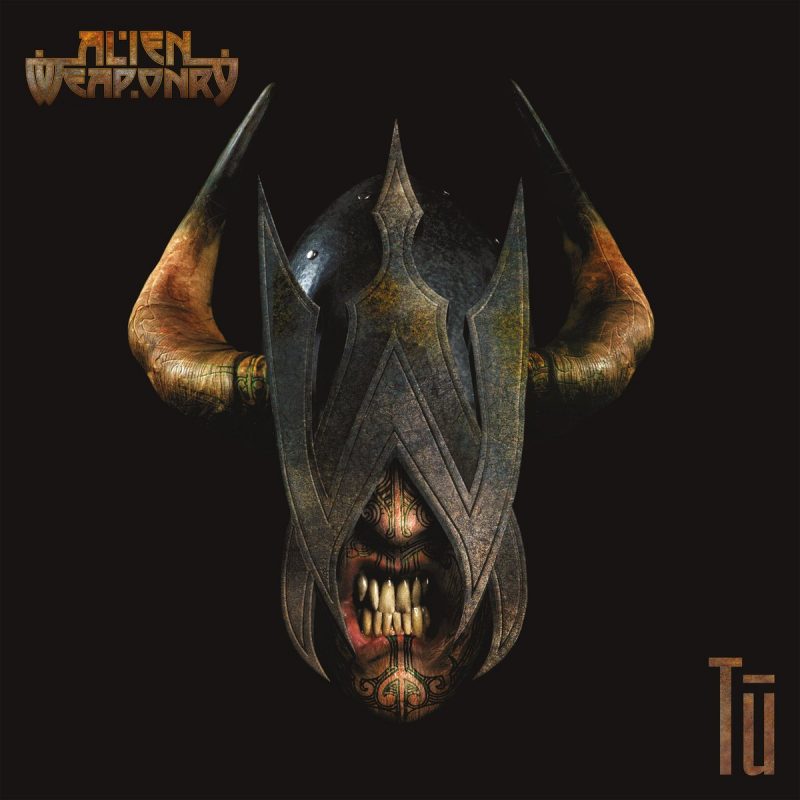Mythical Māori figure Tūmatauenga is known as the god of war, among other things. That should give you a fair idea of what to expect when considering that metal trio Alien Weaponry have named their debut album after him.
Tū commences with “Waikōrero”, a haunting welcome recorded in some Waipu caves. The air hisses and hums as a purerehua [Māori bullroarer – literally translates as moth/butterfly] spins around overhead, while koauau [traditional flute] pierces the atmosphere with shrillness. Henry de Jong recites a welcome in his native tongue. This is how you set the mood.
Which makes the hard-hitting aggressive nature of first song “Rū Ana Te Whenua” all the more powerful by comparison “Listen up!” they cry: hear our message! Cue savage riffs and frenetic blast beats as they chant about the forces of nature unleashing. Death is coming! They reference caves where the dead lie resting, possibly similar to the caves where they recorded the “Waikōrero”. All this mention of death and destruction works in well with the heavy nature of the music, especially considering the warrior-like cries that the band emulate. The boys derived inspiration for the track from the stories of their tupuna [ancestor], Te Ahoaho, who fought the British at a notable battle of Pukehinahina (Gate Pa) in 1864.
I should mention that most songs on this album are not sung in English. New Zealand has two official languages: Te Reo Māori, and NZ Sign Language. [Surprisingly English isn’t an “official” language of NZ, although may as well be considered so by default]. Obviously sign isn’t going to feature in audio music recordings. And Māori is criminally under-represented.
Which makes Alien Weaponry unique, even within New Zealand. Sure, we’ve got a few token songs sung in te reo that charted here and there. Taika Waititi’s film Boy brought “Poi E” back to public conscious in 2010. I still remember the goosebumps I got when watching Tiki Tane perform “Tangaroa” at the NZVMAs as a teenager. Personally, the only use of reo I had in my music collection before Alien Weaponry was Kerretta using a karanga on “Kawea Tātou Ki Ngā Hiwi“.
This is obviously a big point of difference for the band. And it’s done with authenticity. The haunting mournful cries reflect karanga, and the strong chants could be compared to haka and war songs. They even use traditional instruments, which are effective in setting the tone as well as adding cultural value to the music.
Don’t let this put you off. You may not understand it all (I don’t), but this does little to detract from the music. I think it enhances the music by adding unique elements. Half of the tracks on the album are written in English anyway, with many songs also featuring dual languages.

Lewis de Jong playing in Porirua on Waitangi Day. Image: Joseph James (Will Not Fade)
They touch on some heavy themes. “Holding my Breath” looks at struggling with anxiety, “PC Bro” explores the effects of social media, and how we can create false realities through it, and “Nobody Here” also explores the addictive nature of it. Fighting racism and retaining cultural identity are themes woven all throughout.
There’s also more than a few nods to their whakapapa [family history], with references to pre-colonial times and New Zealand historical events that happened once the European settlers arrived. “Kai Tangata” – the name a reference to war parties and cannibalistic practice – looks at how one Ngapuhi iwi [tribe] slaughtered another iwi with the use of muskets, which obviously outmatched traditional weapons that Te Arawa possessed. “Urutaa” tells a tale of how Europeans brought illness that Māori had no immunity against, which led to misunderstanding and paranoia.
“Raupatu” – the standout track on the album – is heavy, memorable and features a brutal breakdown. It translates as “Confiscated”, and discusses how the colonist government stole the lands from the native peoples, and set about trying to destroy Māori rights and identity. For many years Māori children were beaten at school for speaking their own language, the language that Alien Weaponry sing. But the message from the bridge is unmistakable:
“You take and take
But you cannot take from who we are
You cannot take our mana – (dignity)
You cannot take our māoritanga – (cultural identity)
You cannot take our people
You cannot take our whakapapa – (family heritage)
You cannot take, you cannot take
Raupatu!”
One criticism (if you can call it that) is that the sample at the start of “Whispers” is an interview with prominently racist politician Don Brash. The problem with this is that he is a lazy and ignorant man, and mispronounces the word ‘Māori’. I just wonder if international listeners would think that this is correct pronunciation, considering that they’d have no reason to know otherwise.
The production is decent. Tom Larkin from Shihad played a part in production, which earns them bonus points from me. I could certainly see an extra guitar coming in useful for filling out the sound, but they trio sound damn good for just a a three piece. And although it is thrash metal, they use dynamics well, as well as the traditional Māori instruments already mentioned, so it’s not all just a chug-fest that gets tired quick.
Put simply – this is an incredible release. A strong statement both musically and thematically, and all the more impressive when you consider that three school boys are behind it all. I am proud of Alien Weaponry for what they have achieved to date (including raising over USD $12,000 to record this album, and signing to Napalm Records), and can only see them gaining more success as they introduce their strong cultural identity to the world.
Alien Weaponry links:
Website: http://alienweaponry.com
Bandcamp: https://alienweaponry.bandcamp.com/album/t-2
Youtube: https://www.youtube.com/c/alienweaponry
Facebook: https://www.facebook.com/AlienWeaponry
Twitter: https://twitter.com/AlienWeaponry
Instagram: https://www.instagram.com/alienweaponry/
Joseph James
See also:
NGĀ TAMATOA WAIATA: AN INTERVIEW WITH ALIEN WEAPONRY (November 2017)
Update March 2023: Here’s a link to an academic thesis that I found online that cites my article and explores the wider reception of this album
Analysing decolonial glocalisation in the
themes, performances and discourses
surrounding Alien Weaponry’s debut album
Tū (2018)
Didier Goossens

